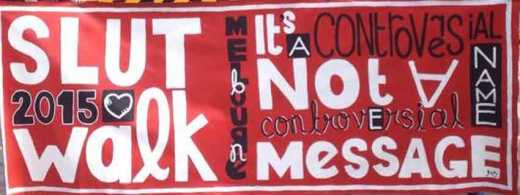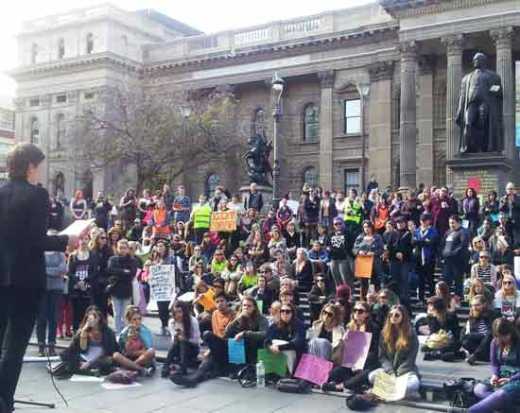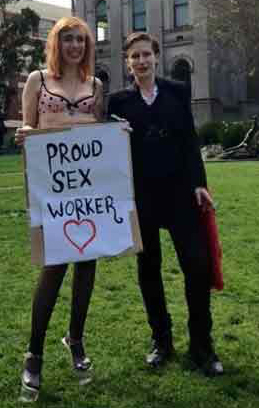
My name is Jane Green and I am a current sex worker.
I am speaking today, as a sex worker and also on behalf of Scarlet Alliance[1], Australian Sex Workers Association and also Vixen Collective[2], Victoria’s peer only sex worker organisation.
I do not speak for all sex workers, because no one can.
I speak from my own personal experience of sex work.
This has been a difficult speech for me to write, not because there is a lack of things to say – but because there is so much.
Much like the Dickens quote, I often feel like it is both the “best of times” and the “worst of times”.
The “best of times” because as sex workers we are constantly fighting for our rights, often achieving so much, and yet it is still the “worst of times” because conservatives and anti-sex work feminists are arrayed against us trying to erase our successes and criminalise our work and lives.
To us, to sex workers, this fight is eternally visible – it is the fabric of our lives and work. But to those that are not part of our community it is often hidden and I believe this is what makes it easier for people to turn away from our struggles, rather than joining us as allies.
Sex worker organisations across Australia and across the world work ceaselessly for the full decriminalisation of sex work – this is supported by the United Nations, the World Health Organisation, Human Rights Watch, Australia’s National HIV Strategies, Scarlet Alliance, Vixen Collective, sex worker organisations nationally and globally – and most recently Amnesty International. Yet we are still working, we are still fighting.
I would like to take you on a tour of what that work is like for me as a sex worker and survivor of rape, over just the last two months.
Vixen Collective, of which I am a member, recently filed a submission with the Royal Commission Into Family Violence (Victoria)[3] . Sex worker organisations across Australia work tirelessly on violence against sex workers, and laws such as the licencing system in Victoria make it much harder for sex workers to report violence to police, or to seek justice through the courts.
Imagine my depressing lack of surprise when submissions to the Royal Commission began to be published and I realised anti-sex work group Project Respect had claimed in their submission that they were the:
“..leading agency addressing violence against women in the sex industry“[4]
This strangely omits in Victoria – Vixen Collective, RhED[5] and Melbourne Sexual Health[6] -but also every other sex worker organisation in Australia.
Project Respect, commonly referred to as Project (dis)Respect by sex workers, also states that:
“..failing to address family and other male violence against women in the sex industry makes other women vulnerable to men’s violence..[7]”
This is a shocking form of victim blaming – essentially blaming sex workers for violence against ALL women – rather than focusing on perpetrators of violence and the systemic causes of that violence.
Most important is the fact that Project Respect is NOT a sex worker organisation but rather an organisation that seeks to criminalise our work, via the Swedish Model[8] of sex work regulation, which would place sex workers at greater risk of violence.
Project Respect also publicly state that they are working towards the abolition of ALL sex work[9].
But this is common. Anti-sex work groups attempts to silence sex workers in Australia abound.
Vixen Collective held the Festival of Sex Work[10] in August of this year. There were sex worker only peer education workshops. Public events to demystify sex work. Social events for sex workers, a film night, lunches, and much more.
As part of the closing of the Festival a protest was held in Swanson Street and photos (of sex workers that were comfortable having their photo taken) were posted on social media.
We were almost immediately attacked by a member of an anti sex work group on Twitter – claiming that there were no “women of colour..but plenty of white men”.
Now I have nothing specific against white men (many of them give me money), but I only remember five or so “white men” out of about nine-five protesters, and the lead speaker was Rory – an aboriginal street based sex worker.
So either the person attacking us on Twitter was at a different protest or they just made that up to be a troll. Which is actually a common thing – harassing sex workers online.
Second only to harassing sex workers in person.
Since I’ve been involved in sex worker activism I have had my photo taken by radical feminists, been called a “cult leader” on the internet, had “pimp lobby”[11] shouted at me while speaking at an Amnesty International meeting and been called privileged so many times that as a ex-street based sex worker, rape survivor, someone who has experienced homelessness throughout my life, and member of a marginalised community subject to stigma and discrimination – that I’m frankly a little over it.
But I’m also over it because when it comes to the laws that affect sex workers lives and work – the voices of ALL current sex workers are critical. Because regardless of what anyone else says we’re the ones who have to go back to work tomorrow and live with the consequences. It is our lived experience that counts and it is our lives that will be affected.

Crowd at Slut Walk Melbourne, Sept 5th 2015
Finally I want to tell you about what I experienced when speaking in Western Australia, at a forum on sex industry regulation[12], opposite Peter Abetz (a Liberal politician) and Simone Watson (current Director of NorMAC, an anti-sex work group).
Much of the rhetoric of both of the opposing speakers centered around silencing sex workers. Anti-sex work groups often like to claim that either sex workers are so downtrodden we can’t speak for ourselves (and must be rescued) or if we do speak for ourselves then it’s a sign we’re privileged (so we shouldn’t be listened to).
This is a tactic used by anti-sex work groups, designed to silence anyone who does not agree with them. But what is really telling if you listen to anti-sex work groups, is the language they use to describe sex workers:
They call us “product” not people
They say sex workers “sell their bodies”, but my body is still here, I sell a service
But most tellingly – just one day after the Amnesty International decision to endorse decriminalisation of sex work – Simone Watson, Director of NorMAC, said the following:
“…at McDonalds you’re flipping the burgers, in prostitution you’re the meat…”
Let me be quite clear.
Those that seek to deny sex workers human rights – are essentially denying sex workers are human.
Those that outright call sex workers “meat” – aren’t even trying to hide it.
So I go back to what I said at the start.
To us, to sex workers, this fight is eternally visible – it is the fabric of our lives and work.
To you, I hope it is now more visible – make a choice, make a difference – join us as allies.
(If you’re not sure what you can do, ask us how)

_________________________________
Want more information on joining sex workers in fighting for the full decriminalisation of sex work in Victoria?
Join Vixen Collective on Twitter here: @VixenCollective
Or visit Vixen Collective’s website – vixencollective.blogspot.com.au
Want to support sex worker rights at a national level in Australia?
Join Scarlet Alliance on Twitter here: @scarletalliance
Or visit Scarlet Alliance’s website – scarletalliance.org.au
You can follow me directly on Twitter at: @sexliesducttape
To find the details of other state and territory sex worker organisations – click here
_________________________________
References
[1] Scarlet Alliance (Australian Sex Workers Association), http://scarletalliance.org.au/
[2] Vixen Collective (Victoria’s peer only sex worker organisation), http://vixencollective.blogspot.com.au/
[3] Royal Commission Into Family Violence (Victoria), http://www.rcfv.com.au/
[4] “Project Respect is the leading agency addressing violence against women in the sex industry“, Project Respect Submission into the Royal Commission on Family Violence, pg2
[5] Resourcing Health and Education (RhED), http://sexworker.org.au/
[6] Melbourne Sexual Health Centre, http://www.mshc.org.au/
[7] Project Respect Submission into the Royal Commission on Family Violence, pg2
[8] Amnesty (again) – Statement to the AGM, https://sexliesducttape.me/2014/07/06/amnesty-again-statement-to-the-agm/
[9] From Project Respect website, ‘Our Vision’: “Project Respect’s vision is for a world where women are free from..prostitution..”
[10] Festival of Sex Work, http://festivalofsexwork.blogspot.com.au/
[11] Amnesty International: Decriminalising Sex Work – What Are the Issues?, https://sexliesducttape.me/2014/07/05/amnesty-international-decriminalising-sex-work-what-are-the-issues/
[12] Forum on Regulating Sex Work in Western Australia, https://sexliesducttape.me/2015/08/12/forum-on-regulating-sex-work-in-western-australia/
Thank you. & I agree – it is not a privilege, but a human right to speak up.
Love and solidarity. J.
Brilliant! Sweet Smart Strong and Sexy. Translating it for sex workers in Thailand. Comment on voice ,representation and privelage. “Whovever. raises their voice to say sex work is work, sex workers rights are human rights, take the crime out if our work(decrim) whether rich poor white nonwhite old young. ..whoever they are they are speaking our words and singing our song. Sex worker everywhere can speak up for each other… not a privelage to speak..its a human right and a duty too.” Mai, Ongsin and Jun
The power we share the power we have.